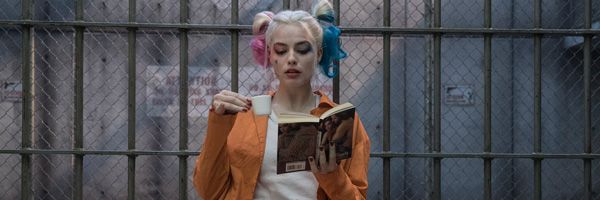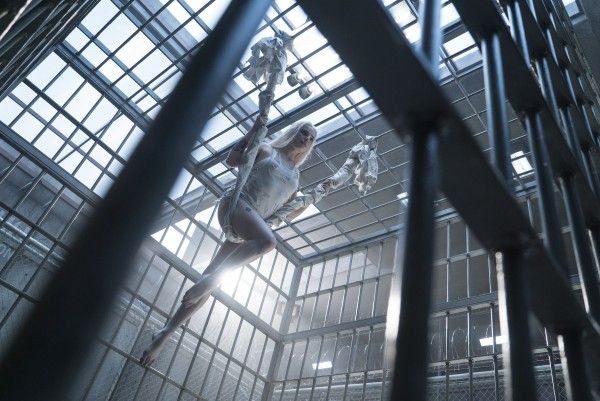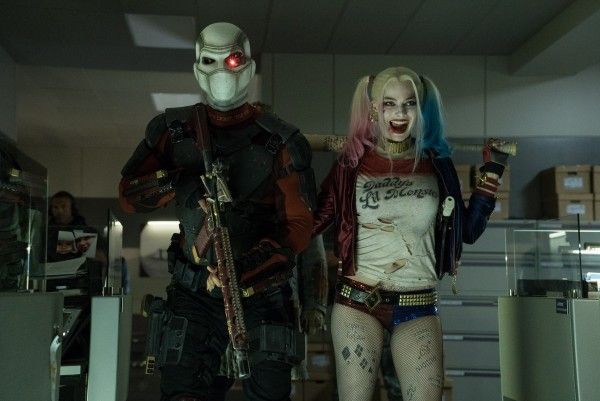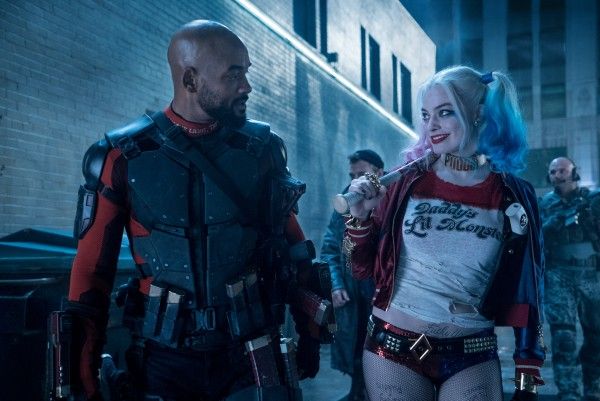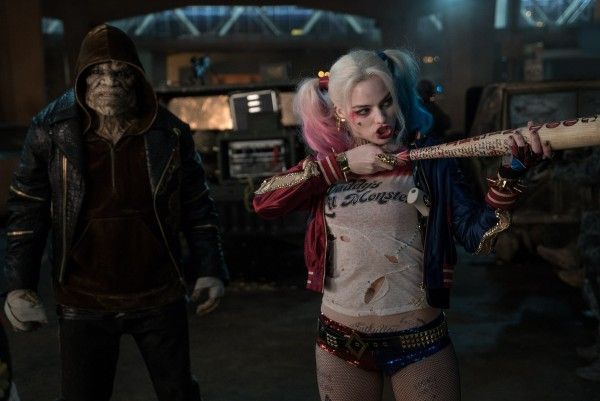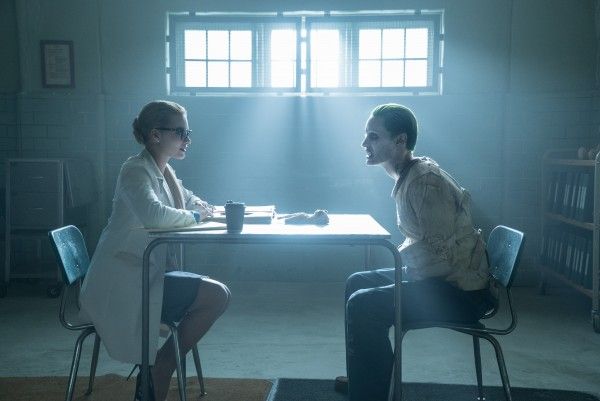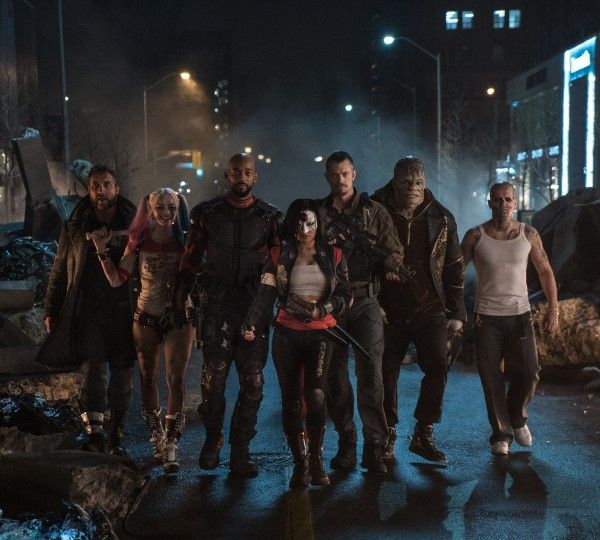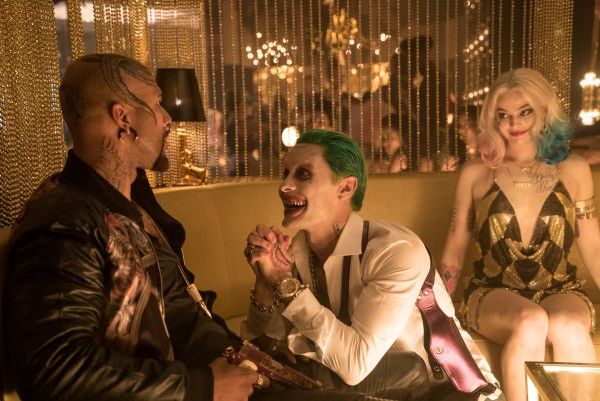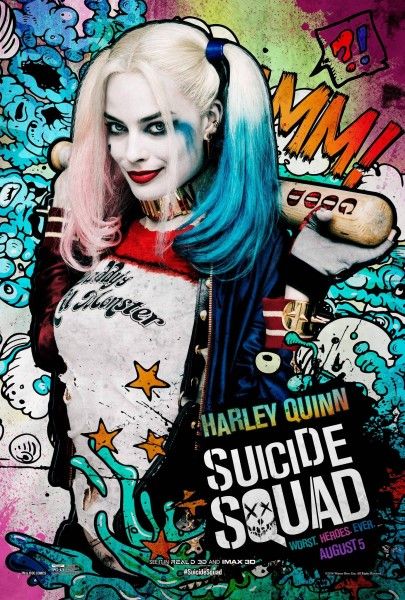From the moment we learned that Margot Robbie would be playing Harley Quinn in Suicide Squad, it was perfect casting. The fresh-faced actress was coming off a star-making turn in Martin Scorsese’s The Wolf of Wall Street, in which she more than proved her dramatic chops, but she also proved her range in the romantic caper Focus, in which she starred opposite her eventual Suicide Squad co-star Will Smith. Now, with a month to go before writer/director David Ayer’s villain-centric film hits theaters, Robbie is consistently the standout in any and all trailers, and there’s already word that she’s spearheading a female-centric DC Extended Universe spinoff film with Quinn and various other characters.
But let’s go back to the beginning. Last summer, I was invited to visit the Toronto set of Suicide Squad along with a small group of reporters. While the scene we were supposed to see be shot was rained out, Robbie graciously agreed to stick around and speak to us about the film and her experience thus far. The actress discussed the daunting prospect of taking on such an iconic character, where she turned to for research, the intensely personal rehearsal process, her training regimen, and the difficulty of doing everything everyone else does while wearing heels.
Robbie, of course, also talked about Quinn’s relationship with The Joker, how she was able to make sense of it in her head, and the experience of working opposite Jared Leto as a method actor. It’s a fascinating deep-dive interview that I do think you’ll find engaging. Take a look below.
Question: How exciting and daunting was it to take on such an iconic character?
MARGOT ROBBIE: Very daunting, for sure. Fortunately, everything kinda moved at such a quick pace and I was working on some other projects at the time, that I didn't have as much time to think about it. Which I think was definitely a blessing in disguise. And since then, we've kind of been straight-training and stuff, and it all just moved kind of quickly that we got here before we realized it. Definitely I've had a lot of moments of panic, where I'm like 'Oh God, they're gonna hate it.' And there's just so many people to please, and you can't ever really make everyone happy. So, do as much research as possible. Put as much of myself into the role as possible. As long as I do my absolute best and prepare as much as I physically can, hopefully, hopefully people are happy.
There are so many iterations of the character from the comic books when it was first introduced, to the cartoon—more recently she's been, like, in the Suicide Squad comics. Did you get a stack of comics to read for research?
ROBBIE: Yeah, well, I got the role right before Christmas, so my Christmas list consisted of Harley Quinn comics, Suicide Squad comics, any comics that, like, incorporate Harley Quinn. So yeah, I have a massive stack.
Did Geoff Johns recommend some stuff, or did you kinda find your own?
ROBBIE: No, I just did my own and whatever my family gave me for Christmas, really.
Can you talk about the expanding role of female superheroes, or anti heroes in your case, and how Harley Quinn fits into that?
ROBBIE: I don't think it's any secret that the industry is definitely gravitating towards female leads and giving the women a voice. And I think they've finally realized that women go to see movies as much as men do. Ticket sales are coming from them as well, so why not appeal to them? I think they're finding a way...I think the superhero platform gives the female character, you know, a relate-ability for the male audience as well. So, I think that's why people are kinda gravitating towards female super hero characters, and also female characters in general as big parts of the film. So, that's great for us, female actors who want to do roles like that, which is really great. But um, Harley in particular, like you said earlier, she's like a very—she has an endearing quality even though she is technically one of the bad guys I was kinda searching online trying to figure out why that was, that even though...you know, how do you make someone likable when they're doing horrible things? Definitely her soft spot for Joker seems to be something people relate to and empathize with. And it makes her more real. And I think, also the fact—not just for Harley, but all the characters—because they are so flawed, I think it makes them very accessible for an audience, and I think the fact that they are super villains kind of makes them a little more exciting, and like I said, accessible. So yeah, I think you definitely don't need to be a good guy to win the audience over.
We were just talking about the six weeks of training that you guys had to do. Was this the most intense amount of training you had to do for a role?
ROBBIE: I started training in November last year, so it was more like six months for me. But, uh, yeah, definitely by far the most training regime I've ever gone through.
Specifically for this role, you were training since November?
ROBBIE: Yeah.
What was the hardest part for you? We heard that you're dancing, you're fighting...
ROBBIE: Yeah, I mean, ironically enough, it's the more simple things that prove to be the most difficult Like I can technically learn...you know, I started doing gymnastics, I started doing gun training and this and that. I can understand the technical side of how to do something. Oh, that's how you can do a forward walk over or a hand stand for thirty seconds? But I didn't have the physical strength to allow myself to do those things. Even the gun training. If I've done gymnastics for an hour and a half and I go straight to the gun range and I'm holding a revolver in my left hand just in case I need to shoot with two hands, my hands are like shaking like this because my muscles are just so sore. And just not strong enough to deal with that, but you have to be able to do that because on set, you know, if you've got a close up shot of the gun in the foreground of the frame and it's shaking like this, you think, 'Harley doesn't know that she's doing. She doesn't look scary right now. She's definitely going to miss this shot.' So ironically enough, it was the more simple things that I had trouble with.
Can you talk about the psychological complexity of the relationship between her and Joker, and what she basically goes over to the dark side for? What is it about him? Can you talk a little bit about the sort of Sid and Nancy thing that comes up?
ROBBIE: Yeah, I spent a lot of time trying to figure out their relationship because it's so easy...it's kinda like when your friend is in, like doing something stupid in a relationship, and you're just so frustrated. You're like, what are you doing? Why are you doing that? So it kinda feels like that when you watch it, when you're reading comics and Harley goes back to him. And you're just so frustrated, what are you doing? So I was like, this is really important that I understand, and I want to do the things that she does. I need to really feel like that's how I would react in a situation. I ended up landing upon codependency as the tact to take with that. And it turns out it's far more...It's like a compulsion, I suppose. It's kinda when you start looking at it the way an alcoholic is compelled, you know, needs to have a drink. When you think of it in those terms, like it's an actual psychological problem, which codependency actually is, in really severe cases of codependency. So the more research I did, the more it made sense for me to behave the way she behaved.
The producers compared Harley to Hannibal Lecter where her power of words can mess up anybody. What does that involve for you in terms of how you speak or how you get into someone's head?
ROBBIE: Yeah, yeah, that actually I found really difficult because I find myself in real life, if there's ever tension, I try to diffuse the tension. And that's just a natural reaction for me. Where for Harley it's the complete opposite. And David's really, our director's really encouraged me to hone in on that aspect of her, because it's something that doesn't come to me naturally. Or most people who wanna, like, not be involved in confrontation. But she feeds off that, so any opportunity in the rehearsal process where we did lots of improvising and stuff that's not even in the script but you end up delving into quite deep places. And you're pretty aware that whoever's doing that scene at the time, you know the costars I'm working with, they're kinda feeding off real things, so my natural reaction is to kinda like, leave it be or talk over it, so that we don't have to...but that's not what Harley would do. If Harley saw that they've shown a weak spot, she would like a little scorpion tail just like *psst*, get in there. And I felt so awful and so many times we did, like, these scenes and I was just saying awful things. And seeing that someone's struggling with something in particular, and David's looking at me like, 'you better get in there, that's your window of opportunity right there, take it.' It feels really awful sometimes.
She was a shrink though, too. Did you study any of those tactics?
ROBBIE: Yeah, I kinda wanted, funnily enough. I mean, yes I had to like look into that side of things, which I did and I'm just learning the basics of that and different mental illnesses, and how you recognize them or whatever. But where it became most useful is we started doing rehearsals with Jared Leto who plays Joker, and he's a method actor. So he's in character all the time. Because he's got his facade up all the time, it was really hard for me to get through to him at first, I felt. So I was like, ok I really gotta take this you know, as if, I am trying to crack the Joker. And ended up looking into the MMPI testings they have. It's kinda like a test that psychologists use to determine what mental illness people might have. It's kinda like a list of 500 questions or something, I spent a lot of time reading those, and then whenever we had time to rehearse or improvise, or even in the scenes, I'd just start with those questions. Some of them are basic, and some of them are not. See which ones would catch him off guard, see how he'd react, and I'd be like, ok I'm gonna go for this tact now. It's a lot of trial and error, but yeah, it was definitely interesting to do that side of things.
Can you tell us a little about the costume and the hair, and how you feel when you're done up as Harley? And is there a part of it that you love the most, and on the flip side a part of it that you kinda hate?
ROBBIE: Funnily enough the things that I love the most go very much hand in hand with the things I hate the most, as well, because it looks so amazing when your skin's completely white and you've got tattoos and the wig's crazy, annnnnnd it takes three hours to do. So I hate that I have to...but having said that, without all that hair and makeup, I wouldn't feel like the character at all. When I am all done up I don't look anything like myself, and I start behaving very differently, and it kinda does a lot of the work for you, I guess, with the whole getting into character side of things.
Talking about costume, in the art they released, Harley is wearing stiletto gym shoes. Did you get to push back on that at all, like can I wear some real shoes if I'm gonna be running around?
ROBBIE: Yeah, when the process started—
Twist an ankle?
ROBBIE: Oh trust me, there was a...yes, and anytime anyone on set complains like, 'this is really hard, I'm getting tired," I'm like "everything you're doing, I'm doing in stilettos, ok? I'm doing as much as you, all these stairs we're walking up, I'm doing it in heels." Yeah, no, to begin with we were looking at wearing docs and flat shoes, and then we did the camera tests, and I think was pretty unanimous, that like "you'll be a lot better looking if you've got a bit height." So, that's when the powers that be stepped in and voted on a pair of heels. And then once I knew that it had to be a pair of heels, I was like right, well I want the most badass looking ones. And when I saw the Adidas ones I was like, they are siiiick. It all happened quite quickly, and before I knew it I was like, "ok yeah, so that's the costume." And I walked around in them for a day and I was like, that was the worst idea. Ever.
We've heard the actors have been really integral to developing the characters with David when you first signed on. How did the character evolve once you signed on and had input and you guys talked through the character? How different is it now that that first iteration that was in the script?
ROBBIE: Yeah, that's a good question. Like I said, I had done as much research as I possibly could. I mean, I'm still reading comics as we go. It's really hard to read all of them. But I guess it just takes it to a much deeper level, and he finds parts in you that relate to the character. Which is something that you think you're doing when you do your prep. But then you start working with someone like David and realize that you haven't done that at all. And like subconsciously you were just using your top layers, because you don't want to go to the deeper layers cause that's, you know, terrifying, and you definitely don't want to expose that in front of people that you don't know. But day one we're in the rehearsal room in front of everyone I'd just met and David's like, so tell me about your childhood. It's immediately in deep and you're completely exposed and it's kinda awful but ends up being extremely helpful for the character work and development.
How wild are the scenes between you and the Joker? How would you characterize them?
ROBBIE: Pretty wild. Crazy. I've never seen scenes like it before, personally. It's next level. People better brace themselves. It's weird, they're a fascinating couple. Honestly, I find their stuff the most exciting out of everything. I'd watch a dialogue scene between them over, like, buildings blowing up and guns, which I love that stuff as well. But when they are just—or when they find someone that they wanna pick on, it's scary. Yeah, they're messed up.
With her being so attached to the Joker how does she interact with the rest of the Squad? What is her relationship with them and how does she fit in amongst them, being so completely enamored with the Joker all the time?
ROBBIE: Yeah, fortunately, I mean I was kinda banking on the fact that when Harley isn't around Joker she's slightly less crazy than she is when she is with him. Only because there's a lot of plot points you need to get across, and there's a whole lot other list of characters that have their story lines and stuff. And I find acting 1000 percent crazy all the time it's just totally gonna distract from what we need to be focusing on in that particular scene. When it's a Joker scene, she's pretty nuts because he brings that out in her for sure. And when it's the rest of the Squad's scenes, yeah she has her moments for sure. But she's a little, I wouldn't say sensible, she's never sensible. But she's a little more focused, I suppose.
You said you went back and read some of her stuff to prep. Was there are particular story arc that you related to, a particular run that you liked the most?
ROBBIE: I was obviously really interested in all the parts of how she became Harley Quinn and how she ended up at Arkham, and why she wanted to be there. And then I couldn't really find too much more on...you know, you find bits and pieces, but with the comic books a lot of things, like some coincide, and some are completely different versions and it gets a little confusing. So you kinda have to make up, and decide, Oh I'm gonna go with this version, or whatever. Yeah, so there wasn't...I mean, there are lots of little stories like oh I found that really fun. I always like her romantic story lines because I'm a girl and I can't help it. But the things that I found most interesting were the parts where she had her big initial conversations with Joker and there's a couple bits throughout the comics where you do flashbacks and you see their first conversations and what they talked about and why. Because I just wanted to understand why was she attracted to him why does she love him?
We see the Joker in the fetal position surrounded by all these weapons with Harley looking over him. Have you shot that scene already?
ROBBIE: No we haven't. I saw that too and I was like, ugh, I hope they do it like that.
Is that in Arkham, is that an early kinda scene, you think?
ROBBIE: Um, no it's not in Arkham, but it is a flashback scene. For more on Suicide Squad, peruse the links to the rest of my set visit coverage below:
- 'Suicide Squad': Over 55 Things to Know about the Ambitious DC Film
- 'Suicide Squad': David Ayer on Shooting on Film, Directing The Joker, and Working in the DC Universe
- Here's How Batman Figures into the Plot of 'Suicide Squad'
- 'Suicide Squad' Director and Cast on the Intensely Personal Rehearsal Process

